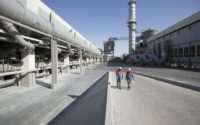UAE Achieves Continuous Accomplishments In Space Sector
The United Arab Emirates – thanks to its wise leadership’s visions – has achieved continuous accomplishments in the space economy sector, which enhances its global competitiveness and contributes to diversifying its economy based on knowledge and innovation.
The UAE has placed the space industry among its top priorities for the next fifty years. The country spent AED22 billion commercially on space-related activities between 2015 and 2020. Also, the contractual agreements for space services and applications increased by 40 percent in 2020, according to the UAE Space Agency.
During the past years, the UAE announced a set of strategies and plans that consolidated the tasks and missions of space sector, with the journey continuing with the Emirati astronaut Sultan Al Neyadi taking part in the longest Arab space mission, which makes the UAE the 11th country to send an astronaut on a long-term mission to space with this mission.
During the past year, the UAE launched the National Space Fund, an AED3 billion fund from the UAE Space Agency. It will support ground-breaking programmes that support international and Emirati companies co-operating in space sector engineering, sciences and research applications.
The UAE Space Agency has developed “Space Economic Zones Programme” to support space startups and SMEs (Small and medium-sized enterprises) to contribute to the national space economy through partnerships with various partners in the country.
The main initiatives of the programme are Space Economy Stimulus Packages, Space Labs and Establishing Space Economic Zones.
The programme aims to achieve three main pillars, which are; creating an attractive and integrated business environment to meet local and international needs, enhancing the competitiveness of companies operating in the space economy, which contributes to strengthening the demand for space applications and services, and stimulating innovation and growing the sector’s economic contribution to the country’s non-oil GDP.
Last year, the UAE Space Agency launched the “Space Economic Survey 2022” in partnership with the Federal Competitiveness and Statistics Centre (FCSC). The survey also involved the contribution of national establishments operating in the sector, including government entities and the private sector, as well as academic and research establishments operating in space technology and communications in the UAE.
The Space Economic Survey 2022 measures how the space sector has contributed to the national economy. The survey focuses on the number of companies working in the sector, foreign investment and the total spending on space projects. It also explores efforts to invest in research and development, space exploration, and the number of people employed in the sector.
In 2019, the UAE launched the National Plan for the Promotion of Space Investment, aiming to increase domestic and foreign investment in the UAE space sector. The initiative promises to transform the nation into a regional hub for commercial space activities and advanced research and development. It also aims to encourage local investment vehicles to consider funding opportunities in the space sector, both domestically and globally.
The Space Investment Promotion Plan aims to contribute towards attaining UAE goals stated in the UAE Vision 2021, the UAE 2071, and the UAE Plan on the 4th Industrial Revolution. In particular, to diversify and ensure the sustainability of the UAE Economy; promote a highly productive knowledge-based economy; provide incentives for R&D and Innovation, encourage entrepreneurship, and SMEs role and opportunities in the private sector.






